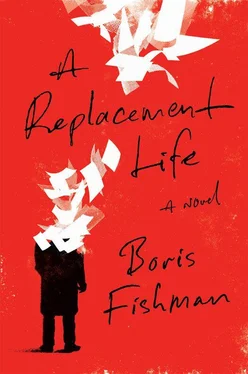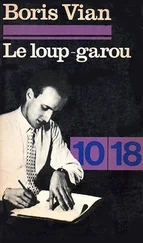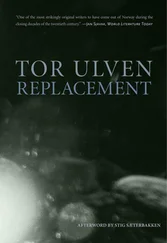“Why is it called Kabul?” he pretended to want to know, the noise level requiring another visit to her neck.
“I don’t know!” she shouted back. “Rocking the casbah or whatever? I don’t know!”
“Casbah is Moroccan, I think,” he said, drawing closer again.
“You should be a fact-checker, Slava,” she yelled. “Don’t worry about it! Dance, drink. You have things to forget!”
“How can I, with you reminding me,” he said.
“Oh, I know I have no influence on that brain.” She tapped his head with a fingertip. “I can’t feel in that fingertip. Sliced it off with a mandoline once.”
He pressed the fingertip like a button. She let him get away with it. “Take nothing on faith,” she confirmed.
Onstage, the Little Darlings whined about playgrounds and beer, Arianna’s face flashing in and out of view in the hopping red light. Eventually, he persuaded her to sit down. She breathed heavily, like a figure skater just off the ice. There was a spray of freckles around her eyes.
“Show me how you pick up a girl in a bar,” she said.
He grunted in objection.
“Are you celibate, Slava?” she said. “Please tell me you never join for anything at work because you’re otherwise engaged chasing tail.”
“That’s it exactly,” he said.
“Give me the rundown,” she said.
Rundown: Slava walked into his first American classroom with an old man’s part in his hair, a striped velour sweater, and the papery smell of the Ivory (cheapest, at seventy-nine cents for four bars) of which the Gelmans availed themselves. Thirty pairs of American eyes assessed this new flotsam and resumed spitballs and notes. Slava could not distract himself from himself as easily. It was not until the following year that he was able to ask for the attention of Diana Gencarelli, whose father owned a bakery in Bay Ridge, which Slava once patronized in the hopes of spotting Diana covered in flour. He would help her dust it off and then they would hold hands as they walked past the Arab groceries. Alas, Diana was not there. Diana was not there even when she was in front of him at PS 247. The rundown ran downhill.
In succeeding years, Slava Gelman was not without attention from the opposite sex. He did not look like most of the people in South Brooklyn. (He imagined that leaving the neighborhood accelerated physical alteration, as if the elements functioned differently in Manhattan.) There was nothing he could do about his height — he was from the stunted plains — but he had finagled from God olivish skin that saved him from being identified as an Eastern European barbarian rather than a sun-dappled Turk or even a Spaniard, black eyes completing the Mediterranean picture. His hand bore a long scar from a bottle shard he had dragged across its pillowy skin at six years old; the stubbled line of his jawbone bore a readiness to greet all interruptions with impatience. All the same, next to Arianna, agitating in her beautiful clothes, he felt like a smudge. He stripped off his jacket. Oh for two. It was too hot, anyway.
Vodka sluiced down the rusty pipe of his throat. The events of the preceding forty-eight hours coursed in the opposite direction. All of it ran together, clotted, settled, drained, ran off. He felt a little deranged. He scratched at his jaw, then leaped up and removed himself to the next table. He relished Arianna’s puzzled expression. She listened to him give an imaginary date directions to the bathroom. Then he leaned over. “I have sixty seconds,” he said. “She’s a lovely girl— lovely . But we aren’t right for each other. It’s an almost thing. You’ve had those — nobody’s fault. And then you’re sitting at the next table over. Tell me your name. And your number. Thirty seconds.”
Arianna stared at him, openmouthed.
“Twenty,” he said. “Come on. She pees quick.”
Arianna broke into laughter and began clapping. “You can pick me up any time,” she said. She curled her tongue in a funny way when she sipped from her drink.
He didn’t want to let go of the feeling he’d had a moment before, him advancing on her instead of vice versa. Music clamored from a wheelbarrow-sized speaker directly above them, so it was difficult to think clearly. But he didn’t have to think. Everything that had happened at the office was pleasantly falling away — only for the evening, he knew, but good enough.
“Take me to another bar,” she said. “I can’t hear myself think here.”
They took a meandering route through the neighborhood, louche and gentrified all at once. Slava had come here only once or twice, each time in connection with a story he was researching. They kept stopping because she was pointing out landmarks. She volunteered in this garden. Some music club of renown had been located here. Here — she announced overdemonstratively — she’d had a dark-alley liaison. Purposefully, he didn’t say anything. “So you’re not the only one picking up tail in a bar,” she added unnecessarily, and he relished his victory.
He asked about her outfit, in hopes that she would notice his with greater fascination. These were ponte-knit pants, she said. Supposed to be slimming. “‘You can hold up a bank with those hips, Arianna,’ as my dear mother used to say,” she said. They swerved to avoid a phalanx of nearly undressed women eating the sidewalk.
“She’s not around anymore?” Slava said cautiously.
“My mother?” Arianna said. “Oh, she’s around. Very around.” She ran her arm through Slava’s, and he tried to fall into step with her. “Brentwood,” she said. “Mother Bock had to work out for herself the joy of having a daughter with childbearing hips versus a daughter with wider hips than every girl at the synagogue.” She waited. “This is the part where you say it doesn’t show.”
Slava smiled. “And your father?”
“Spandex factory. Half my yoga class is dressed by the Eagle.”
“Why the Eagle?”
“El Aguila,” she said in a cute Spanish accent. “That’s what the Nicaraguan ladies on the floor call him.” She touched her nose with the tip of the dead finger. “He’s got an amazing escarpment.”
“Not you, though,” Slava said.
“Nose job, sweetheart.”
“It doesn’t show,” he said.
“There you go.”
“You’re close to them,” he said.
“My mother called me a dilettante the other day because I’m not kosher out. I’m like, Ma, that’s a big word! Apparently, the rabbi had a whole sermon on dilettantes.” She pushed her arm farther into Slava’s. “But I like poems, thanks to my dad. Robert Frost was his favorite. ‘Frost is like life, Arianna — as deep as you want to look.’ Then my mother beat it out of him.” They neared a crosswalk and stopped even though the light was theirs. Slava didn’t mind. “They moved to a more religious neighborhood. They don’t talk about Frost at those tables. The Eagle’s an enforcer now.”
“We don’t have to talk about it,” Slava said.
“I don’t mind,” she said, turning toward him. “I don’t mind telling you.”
“I want to hear a poem of yours,” he said.
“Negative,” she said. “I don’t write poems.”
“That’s a lie.”
“Don’t be silly,” she said.
He withdrew his arm and placed it on the cup of her shoulder, turning it toward him. Beneath his fingers, her skin felt taut and giving at once. It was thick, as if the skin descended deep down into her, her center buried somewhere far beneath.
She rolled her eyes. “You have no class. Zero class. You insist on embarrassing me.”
“Sorry,” he said. “You don’t own embarrassment today.”
She rolled her eyes again. “No one made you write that. Take as good as you give.” She pulled back and looked at him. Her breath was soft, flavored with something human but pleasant. “I loved what you wrote. I knew it was yours when I read the first line.”
Читать дальше











